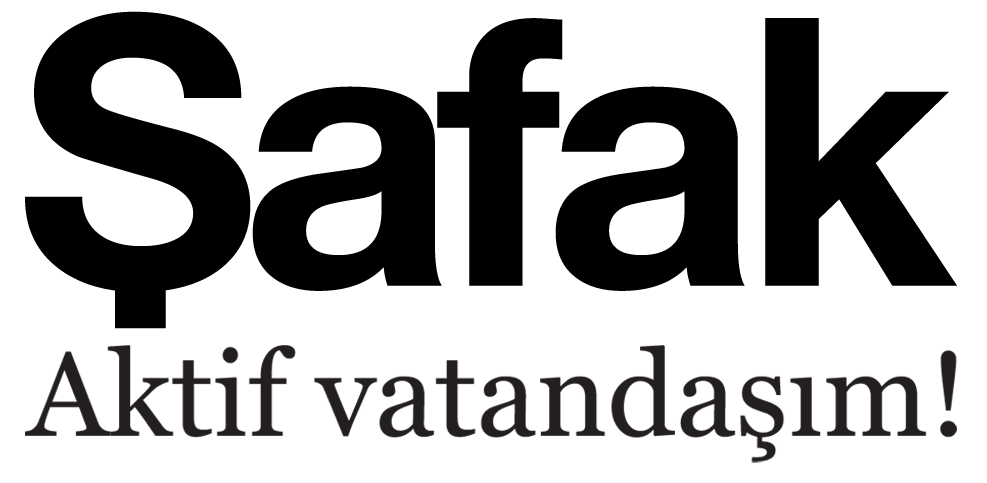Guest Editorial:
A Redefined Life: Safak Pavey Speaks at the 2013 ABJS® Meeting in Istanbul, Turkey
http://link.springer.com/article/10.1007/s11999-013-3339-2 Clinical Orthopaedics and Related Research® ISSN 0009-921X Volume 472 Number 10 Clin Orthop Relat Res (2014) 472:2942-2946 DOI 10.1007/s11999-013-3339-2“The final publication is available at link.springer.com” —— A Note from the Editor-in-Chief: While Ms. Safak Pavey is extremely well known in Turkey, where she currently serves as a Member of Parliament representing Istanbul, she is less well known outside of Europe. This is too bad. Her passion for equality, her values as a legislator, her leadership as an activist, and her understanding as a patient who experienced a terrible trauma make Ms. Pavey a person whose important story should be told and retold. The Association of Bone and Joint Surgeons1 was fortunate to hear her story firsthand at the 2013 meeting in Istanbul, and we felt it worth sharing as part of this symposium on Recent Advances in Amputation Surgery and Amputee Care. The author certifies that she, or any members of her immediate family, has no commercial associations (eg, consultancies, stock ownership, equity interest, patent/licensing arrangements, etc) that might pose a conflict of interest in connection with the submitted article. All ICMJE Conflict of Interest Forms for authors and Clinical Orthopaedics and Related Research1 editors and board members are on file with the publication and can be viewed on request. The opinions expressed are those of the writers, and do not reflect the opinion or policy of CORR or the Association of Bone and Joint Surgeons1. —— I must admit I am a famous patient (Fig. 1). Sometimes I am asked why I am famous, and my answer always feels strange to me: ‘‘Because I had an accident.’’ Doesn’t that sound absurd? Such stories always have multiple realities, and only doctors truly understand it all. They witness more of a patient’s journey than the family does. My journey began in May 1996, when I was a 19-year- old arts student. I was at the Zu¨ rich train station early in the morning, sending my friend Miralowski, a cancer patient, from Zu¨ rich to Geneva for a chemotherapy session. I held him in my arms as I helped him board the train. As I was trying to get him on board, I realized that the train started moving with its doors open. One of us was definitely going to fall. I remember pushing him forward into the train, and then falling. Some people get hit by cars or fall on rail tracks, get up, and move on. That was not how my fall turned out. My life changed forever. There was a lasting, very loud noise while the train and its many wagons left the station. I managed to save my head with only some injury. My left arm was lying a bit further away, separated from me. My left leg was torn apart. I had been at odds with my left side since my childhood. Even though I try to hide it, my left ear is protruded. My mother would stick my ear to my head with duct-tape for months at a time when I was a baby. They never evened out. As a child, I remember being regularly mocked for my left ear sticking out. No surprise, perhaps, that the accident would target my left side. I remained conscious during the accident. As I lay on the ground, I interacted with the most handsome doctor in the world. ‘‘Can my arm be saved?’’ I asked, holding the arm in my hand. ‘‘It’s too late,’’ he replied. ‘‘Then please save the rest of me.’’ I would later discover that my doctor believed this sentence was the first sign of my will to live, describing it as ‘‘magical.’’ Normally, I am not so blunt, but I know that doctors face these events on a daily basis. I did not feel constrained by sensitivities. Catastrophes make our subconscious more transparent. It may be unscientific of me, but I have always felt that our instincts are useful in sensing what is about to happen to us. A few days before the accident, I felt extremely uneasy, like an animal sensing an earthquake before it happens. I even wrote in my diary that I felt there would be a dramatic change that I would carry for the rest of my life. Every now and then, I still look at my diary to read that sentence and wonder how a passionate and adventurous young girl could have written such a thing. Perhaps our instincts to sense disasters are as strong as those of horses or dolphins, but we are unable or unwilling trust them. Similarly, my mother, who at the time of my accident was in Istanbul, later told me that at 10:00 AM that day she felt a sharp pain in her nose. In Switzerland, it would have been 9:00 AM — the time of my accident. 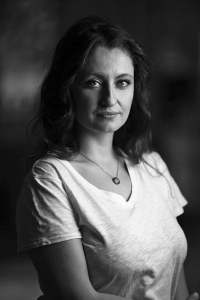
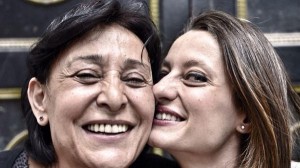 Fig. 2 Pavey (right) with her mother (left). Reproduced with permission from Safak Pavey.
Fig. 2 Pavey (right) with her mother (left). Reproduced with permission from Safak Pavey.
As you can guess, the accident was followed by a lengthy hospital odyssey. Physicians deemed me an inter- esting patient. I think this was because of how I met my family for the first time after the accident. You should know that my mother and I (Fig. 2) have a slight difference in size; thankfully she could not wear my clothes. But I could not save my shoes from her because our shoe sizes are the same. She made it to Zu¨ rich 24 hours after my accident, and insisted that she be let into the ICU. My psychiatrist, who regarded me as a brave patient, was worried that any emotional weaknesses that my family displayed could weaken my resistance. Clearly, she did not know my family. Let me tell you a story. Years after my accident, in 2003, when I was working for the United Nations Refugee Agency, I discovered that I had not been assigned for a humanitarian operation in Baghdad. I hurried to my boss’s office and volunteered for the Iraq assignment. ‘‘You already have the weight of your prosthetics,’’ he replied. ‘‘How will you add another 30 kilos of protective waistcoat and a helmet on top of that?’’ ‘‘I could not explain it to my mother if I did not work in the Iraqi humanitarian operation,’’ I said. He gave me a surprised and merciful look. ‘‘For the first time in my life, I heard of a mother who wants her kid to work in a war area,’’ he said. ‘‘I think you have to leave your family.’’ I remember seeing their blurry silhouettes between my giant, blue bandages as they walked into my room. My mother was wearing my favorite red shoes. I never asked her, but to this day I think she chose them on purpose. Her first sentence did not surprise me, but shocked my doctors, judging by their facial expressions. ‘‘You are having all these operations; you could also have your left ear fixed while you were at it,’’ she said. I smiled looking at her shoes, which of course were mine. ‘‘And I see that you did not lose any time seizing the opportunity to steal my shoes.’’ My 8-year-old brother continued: ‘‘Thank God you’ve had an accident. My teacher is treating me really well these days, even when I don’t do my schoolwork.’’ At that time, I was somewhere between drowning and making it to the surface. My family’s opportunism through my accident had swept aside my feeling of helplessness. My stay at the hospital was filled with never-ending operations and fun memories. I think Dr. Kaiser was probably the most pleased person when I was discharged. He took care of me for the longest period of time and did so with great patience. On one occasion, he needed tissue from my head to graft on my leg. For this, I had to shave my head. I refused to do it unless he did as well. Without any hesitancy, he had his hair shaved. I remember this with eternal gratitude, even as I hope that he never has to encounter a patient like me again. When the dust settles after a disaster, it is easy to find yourself in an inescapably bad place. My doctors and nurses taught me how not to fall into the trap of feeling sorry for myself. They rewarded my confidence by taking me to other patients as a model. The ability to redefine life; the idea that my success could impact the lives of others was, and still remains, an invaluable lesson. I had a lot to do. It would not be a sprint, but a long marathon that would require patience and fortitude. It begun with figuring out the things I could not do. For example, I would never be able to jump again. It was also very difficult to speak with only one arm. As with all Mediterranean people, I used my hands as an extension of my mouth. I would be forced to rely more on words. I soon found that I still had enough courage to make fun of myself. Humor can heal. It has a tremendous value for me. I remember a toy cow given to me as a gift in the Swiss hospital, which made us laugh for days. The cow would moo when I pressed a button on its stomach, and acted as an alarm when nurses came with their needles. Months later, I was at a prosthetic clinic in Mu¨ nster, Germany. While there, my mother was being presented with an award for courage in journalism in New York. The skeleton of my prosthetic leg had just been completed in the rehabilitation department. I was not allowed to leave. I secretly left one evening and boarded a plane. While the doctors were looking for me, I was flying to New York. That evening, there would be high profile guests such as Christiane Amanour, Peter Arnett, Peter Jennings, and the Clintons. They were surprised when they saw me with bandages instead of an arm and the skeleton of a leg. They assumed I was the victim of a bombing due to my mother’s receipt of numerous death threats for covering issues such as mafia-state relations or Islamist assassinations. They seemed unconvinced and almost disappointed when I told them it was the result of a train accident in one of the safest countries in the world, Switzerland. After 15 years, I admit that I am not even halfway back. Today, I work with a Russian therapist to subconsciously open and free up my left hand, which was locked in a fist when I lost it in the accident. It caused me a lot of pain, as I still recall this subconsciously. Even though we have a long way to go, we managed to unmake the fist I carried with me since the accident. It is a way of combating the phantom syndrome that we discovered ourselves. Undoubtedly, there is more than just the physical toll. Accidents and disasters can sometimes remove barriers between people, but also place new ones. The most chal- lenging part was always the unspoken prejudices against disabled people. As other disabled individuals frequently experience, the place society deemed suitable for me, and the place I thought I belonged clashed constantly. My new enemy was the entrenched attitudes in society that refused to give me a place. The public at large reached out to me with pity, with mercy. I rejected it outright because it always has a threatening hidden side — pity and mercy lower one’s place in society. The majority wanted me to be invisible for their own peace of mind. I do not know who these people are, but I knew I had to win this war without being acquainted with them. I became even more visible by challenging their arrogant attitudes that wished me to disappear. I guess my strange accidental fame originated in this struggle. I must confess I learned how to differentiate between what was important and unimportant in my life through this accident. The accident did not change my values, just revised my dreams. Some people use events as an excuse not to continue with their lives. The most appropriate course of action for me would be never leaving the house. But I did leave the house. I chose not to be hidden away. My first moments after leaving the hospital were not easy. It felt like being released after serving a long prison sentence, only to be dropped off on an unfamiliar, aban- doned street. The existence of a strict caste system created for families with disabled people became apparent. In 1996, the bodies of affluent members of society had to be perfect in my country. But a fault of the body or brain cannot be punished with isolation. High-level personal attacks served as an intimidation ploy to have me disappear from the public eye. Well-known columnists wrote articles saying that I was playing games — my optimism was dishonest and had other motivations. When I questioned them and asked, even if it was feigned optimism, what exactly was wrong with it? I received no replies. I chose to fight on and continued to be out there. Of course, I wish I never had an accident. But as it is not possible to go back, we must succeed in being able to move forward. The story can be easily told, easily written, but never easily endured. In November 1996, the press reported my appearance in a restaurant as a ‘‘first time’’ public appearance of a disabled person eating at a restaurant. I had no idea about accessi- bility, but my instincts convinced me that I had a place at that restaurant as much as anyone and everyone else. The first ramp at Kas¸ ıbeyaz restaurant, the first elevator at Bilgi University in Istanbul, the many ramps and lifts at the United Nations Human Rights Office building in Geneva where I would later work (Fig. 3), are all remainders of my times there. I know these are the traces that I share with many other disabled persons who struggle for each change everyday. Leaving architectural trails without being an architect feels rather unique. However, I had more barriers than just the crude architecture drowned in concrete. As far as people on the streets or public sector workers were concerned, begging on the side of the street was the only acceptable public space for disabled people. As someone who went outside without being intimidated by her disability, this meant I was ‘‘crossing a line.’’ Years later, those same people who could not bear the thought of a disabled female making public appearances voted me into office. Today, I have a reputation for being out on the streets all the time, and it suits me well. I love connecting with people and main- taining my public visibility for able and disabled persons alike. Even though we still have not attained the right to accessibility, we did gain the right to visibility. Partially defeating a centuries old prejudice was a happy start for a Middle Eastern society. 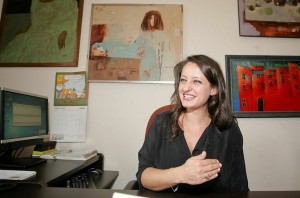
I still am subject to attacks by bigots, but I know how to defeat them now. Recently, I exposed a member of the Justice and Development Party’s Executive Committee who sent me a tweet which read, ‘‘God has taken one of your legs, and you still have not woken up from the sleep of blasphemy.’’ He was removed from office after a public protest. It was just one little step towards hopefully a bigger cultural transformation. This is the kind of hate speech stemming from the ‘‘deep culture’’ that millions of disabled people in my country face on daily basis. I often observe and take great pleasure in knowing that my high visibility and transparency became a source of courage for others who hid away. The often ignored silent majority are slowly stepping out into the daylight. When I look back, I believe that this is the struggle that I can most take pride in. I come from a family that has always given a great deal of thought to how the majority of people face and resist difficulties that they encounter throughout their lives. This prompted me to take an interest in the struggles of others. One of my most difficult and meaningful memories occurred during my visit with Afghani refugee children. We stayed in a settlement without electricity. During my visit, my leg, which is charged by electricity, suddenly stopped functioning. The children found parts from old Soviet radios, and managed to make a small wind turbine to construct a charger. We charged my leg with great ceremony, and laughed a lot in the process. There is no need to look at this with rose-tinted glasses. I also would like to share with you the story of Sitare. Her story has been great company for me to keep, orienting my compass in the right direction, and reminding me of the importance of fighting for rights and freedoms. I had just started on my new humanitarian mission in Iran, when I was called by the guard of our Tehran-based office to meet with Afghan refugees. When I went downstairs to the medical unit, I saw a young woman looking at me, terrified, her eyes filled with pain. In her tradition, her male relatives spoke for her. This is how I met Sitare. By then, I did not know that she would be a turning point in my life. Sitare had a medical problem related to her internal organs, and they wanted a female doctor to examine her. I would meet with her quite frequently as we arranged for her long treatment process. In time, she began to talk with me. Her story came out in bits and pieces. She was born without limbs, and was married off to an elderly man as his third wife when she was only 13-years- old. Yet, Sitare looked the same age as me. She seemingly had grown decades older by being a child bride, a conse- quence of the hard geography into which she was born. Horribly, she was locked up in a dark room for many years, and used only as a sex object. In her circumstances, in that culture, this was somehow deemed acceptable. Her dis- ability meant she did not have any value as a human being; her feelings counted for nothing, nor did her despair. Despite it all, she had survived, and escaped from con- flicts in her hometown with her family. She became a refugee in Iran, resisted the destiny imposed on her, and believed in the existence of another, more hopeful future. Her silence and forbearance were the keys to her survival. I became attached to her with admiration. We overcame many things together. Today, Sitare is back in her homeland where peace, social freedoms, and human rights are, seemingly, a fragile possibility. She tells other girls in Afghanistan about the possibility of another life; they can hope for more than life as a child bride. Sitare’s journey is one of my most important inspirations. Wherever I go, I search for Sitare. Stories like Sitare’s are there, but not always easy to find amidst the dust of extraordinary human-made disasters that have covered the face of the earth today. I believe elevating one person is more precious than targeting unreachable mountaintops. I shall continue to contribute to humanity’s big adventure with my small experiences for human rights. 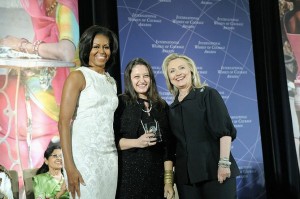
My mission is not over. Back in my homeland of Tur- key, a 13-year-old girl was raped by approximately 24 to 26 men. Just recently, the higher court ruled that the girl willfully gave her ‘‘consent,’’ and reduced the sentence on these grounds [1]. It is time to fight against this decision. In short, life sometimes is very difficult, but looking inwards and making the problem bigger only leads to dead ends. When we shut our doors to the problems of others, I believe we also miss vital opportunities to find our own solutions. Tolstoy wrote that ‘‘happy families are all alike; every unhappy family is unhappy in its own way.’’ Undoubtedly, he is right. In the context of human progress, the driving force has often been the focus on those that are unhappy. When one chooses to involve oneself in common human struggles, when one chooses to be a remedy for the prob- lems of others, then one’s own problems become less important. I believe this is also the best method of self- healing. I guess those who know this best are doctors, nurses, and paramedics. Sometimes, it is inevitable to just focus on oneself. Occasionally, I find myself thinking about my life before the accident. I admit I really do miss jumping around with my clumsy left hand. But I am now much stronger than those who never fell in their lives. Falling is not a very bad thing after all, because you learn how to stand up again (Fig. 4). That is how I see my story. Safak Pavey
Member of Parliament, Representing Istanbul, Main Building, Floor 1, No. 299 Turkish Parliament Bakanliklar, Ankara, Turkey e-mail: safak@safakpavey.com URL: www.safakpavey.comReference 1. Letsch C. Turkish court reduces sentences for men accused of raping 13-year-old. The Guardian. Available at: http://www. theguardian.com/world/2011/nov/04/turkish-court-reduces-rape- sentences. Accessed Oct. 3, 2013.
